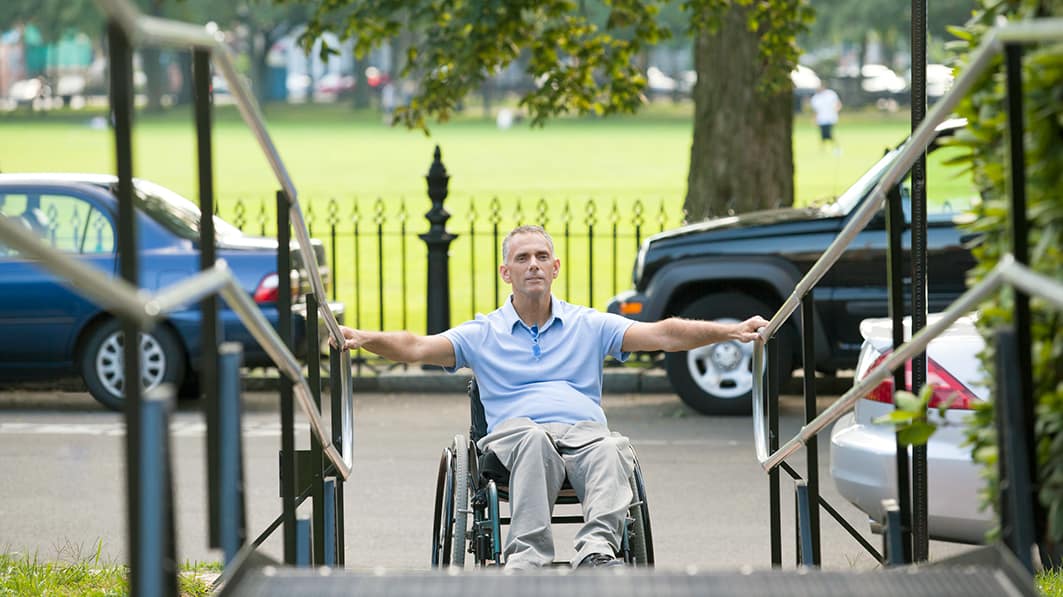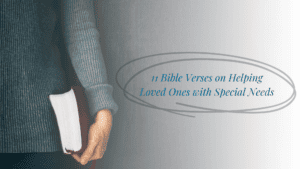All of us carry a perspective on disability that is formed by our worldview. What is yours?
Most of us unconsciously possess at least vestiges of a modernist view of disability that says, “Disability is an abnormal part of life in an otherwise normal world.” It focuses almost exclusively on the functional aspects of disability – the “impairment” or the ways in which a part of the body doesn’t work as we expect it to. For centuries, people with disabilities have understandably resented being labeled as “aberrations.”
As a result, with the advent of postmodernism, disability advocates began to promote an alternative view that focuses almost exclusively on the social aspects of disability – the ways in which attitudes can disable others further (often much further) than the impairment itself. This view promotes the corrective idea that “disability is a normal part of life in a normal world.” A disability is often described as merely a “difference” that is not unlike having a different hair color.
But this view is inherently dishonest. It diminishes the realities of the difficulties associated with an impairment and truncates the grieving process that occurs with the onset of disability. Even worse, it actually absolves others of any responsibility to neighbors who deal with disability. If a disability is indeed a difference that makes no difference, then what does that require of you and of me?
Only a biblical perspective on disability addresses both the functional aspect (the impairment itself) and the social aspect (the attitudes that disable further) in a way that resonates with reality. Disability, from a Christian vantage point, is a normal part of life in an abnormal world. It is a result of living in a fallen world where nothing is as it was originally intended to be – not the bodies we live in or the attitudes we possess. It is just a more noticeable form of the brokenness common to the human experience.
In other words, disability opens up to us a Gospel picture that mirrors the universal human condition back to us as individuals.
For, if we don’t recognize that it was our triune God’s compassion for our profound spiritual disabilities that caused Jesus to lay down His life in order to provide access to the Father on our behalf, then we don’t really understand the Gospel. And if Jesus can do that for us, how can we not do the same for our neighbors?
Repenting: Turning Away from the Idols of Our Hearts
The reason we often don’t do the same for our neighbors is because of the idols of our hearts. In the opening portion of the Beatitudes, Jesus describes the posture of a kingdom disciple: poverty of spirit, mourning over sin, and meekness (see Matthew 5:3-5). But, in our fallen state, those are hardly our natural qualities. Indeed, those characteristics are oppositional to our heart idols of self-reliance, self-protection and self-promotion.
An experience with disability, whether our own or someone else’s, brings us face-to-face with these false saviors that actually serve as barriers to loving interaction.
Self-reliance insists that we can do things ourselves. This includes fixing what is broken or difficult. But, as a good friend of mine says, “Disability is not like cancer—you can’t get to the other side of it.” There is a relentlessness to disability that defies fixing. There is also a need for the assistance of others that defies autonomy. So we run – we run from the endlessness of it and we run from the interdependence of it. Except, of course, we can’t. Ultimately we must live with the endlessness and the interdependence of it.
Self-protection wants to hide from pain. There is a lot of pain in this world, and we find countless ways to avoid being emotionally exposed to it. In addition, we want to hide from the reality that every one of us is only one breath away from, or one car accident away from, or one bad delivery room experience away from a life-changing disability. Avoiding people with disabilities and their families allows us to perpetuate the illusion that we are in control.
Self-promotion also helps perpetuate the illusion that we are in control. We bolster ourselves by saying, “This is my life: I can direct it as I choose. This is my family: I can plan it as I choose. This is our church: We are free to invite and to include whom we choose.” But are any of those thoughts really true?
Reordering: Setting Priorities that Reflect Christ’s Own
Instead, Jesus offers us a wonderful Gospel opportunity through our encounters with disability. As He so aptly pointed out to His disciples regarding the man born blind in John 9, disability is an opportunity to see “the works of God displayed” in our lives. By realizing that disability is a picture of the Gospel story – our story – and repenting of all the ways in which we don’t reflect the posture of kingdom disciples, we can seek God’s grace and power to reorder our lives and our congregations according to Jesus’s priorities.
In Matthew 23:23, Jesus admonished the Pharisees by saying, “Woe to you, scribes and Pharisees, hypocrites! For you tithe mint and dill and cumin, and have neglected the weightier matters of the law: justice and mercy and faithfulness. These you ought to have done, without neglecting the others.”
Justice. Mercy. Faithfulness.
These qualities reflect the character of Jesus, who is the image of God.
Justice is the appropriate use of power to do what is right and fair. It is the restorative power of the Gospel – the coming of the kingdom – applied to the social dimension of disability. It is the healing of attitudes that disable further than the impairment itself. But often injustice is at work in our congregations. The most common type is passive injustice, the holding down of another through what is not done: the access ramp that isn’t there, the Sunday school class that doesn’t adapt for special needs, the youth leader who doesn’t move toward the teenager with autism.
Mercy is the restorative power of the Gospel applied to the functional aspect of disability. It enters into a situation by choice, engages with intentionality, and addresses the difficulty. St. Gregory of Nyssa once said, “Mercy is a voluntary sorrow which enjoins itself to the suffering of another.” Mercy provides respite care to the tired parents of a child with autism. Mercy offers transportation to the man with Down syndrome who cannot drive. Mercy mourns with the person who has been diagnosed with the degenerative condition of multiple sclerosis.
Faithfulness brings the restorative power of the Gospel to the relentless difficulty of disability. God’s love for you and for me is a relentless love. It is faithful for the duration. Faithfulness does more than deliver a casserole for a day; it walks alongside someone for the journey.
Faithfulness walks beside the family of a child with developmental disabilities over the span of a lifetime—from diagnosis, to early intervention, to schooling, to the transition to adult living, to the aging of the parents, to the passing of the caregiver baton to the extended family, and eventually to the death of the individual with special needs.
Faithfulness intentionally stays with the family whose wage earner has become a quadriplegic – through rehabilitation, through home renovation, and through the relentless “daily-ness” of all the irreversible changes that such dramatic loss of function brings to every member of the family.
Special Needs Ministries Help Churches Bring the Gospel to All
Most churches have people on their rolls who have special needs but are living on the fringes of congregational life. In every neighborhood in every town in every state in the country, there are people with disabilities. These people live largely outside the influence of the Gospel. One of our goals as Christians should be to reach them with that message of hope in whatever ways we can.
In my work with MNA Special Needs Ministries, an outreach ministry of the PCA’s Mission to North America, we purpose to “make the Gospel – the good news of the coming of the kingdom – accessible to all in word and deed.” We offer a variety of resources and training opportunities to help local congregations fulfill that purpose as well.
Disability ministry isn’t a program. It’s a relationship, one that makes the Gospel accessible to another human being who needs it just as much as you and I do. If your church needs assistance in this vital area of kingdom life, please contact us. Together, we can help to share the gift of God’s redeeming grace with everyone.
Stephanie O. Hubach is director of MNA Special Needs Ministries. She serves on the Lancaster Christian Council on Disability (LCCD), is on the Advisory Board for Chosen Families, and is a visiting instructor of practical theology at Covenant Seminary.
This article originally appeared in Covenant, the magazine of Covenant Theological Seminary, Vol 28, No.2, 2013, pp 19-21. Disability Ministry and the Local Church: Hard Experiences, Gospel Opportunities, © Stephanie Hubach. Used with permission.



















